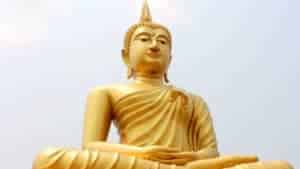One needn’t be a Buddhist to learn from the Buddha. Hindus, Jews, and even Christians study and implement some of the Buddha’s teachings. Many Christian contemplatives and historians also compare the words of Buddha and Jesus side-by-side, even writing books that point out the similarities between their discourses.
One big reason why Buddha has become universally adored is his inclusive “Come as you are!” attitude. He turned away no one. Furthermore, he demonstrated the utmost patience, even to those who insulted – and also injured – him.
Buddha also appealed (and continues to appeal) to the skeptics, never demanding devotion or blind faith. He was, as a fact, both a rationalist and a pragmatist. He encouraged people to put his teachings to the test and see for themselves. How refreshing!
Unfortunately and unnecessarily, much of modern religion tends to turn its collective nose up to the notion of empiricism; instead, requiring this illogical devotion and blind faith. This practice is a massive no-no in the Buddhist tradition.
Buddha made is clear from the get-go who he was. Not a God, but an enlightened being.
A Story About Buddha
Buddha explained this in a fascinating conversation that reportedly took place between Buddha and a man named Dona, the brahman. According to the Dona Sutta of the Pali Canon, the latter knew that something was different about the Buddha’s footprints, exclaiming, “How amazing! How astounding! These are not the footprints of a human being!”
The man approached the Buddha, who was sitting at the root of a tree and asked:
“Master, are you a [god]?”
Buddha replied, “No, brahman, I am not a [god].”
“Are you a heavenly being?”
“No…”
“…a [holy man]?”
“No…”
“…a human being?”
“No, brahman, I am not a human being.”
“Then what sort of being are you?”
“Just like a red, blue, or white lotus – born in the water, grown in the water, rising up above the water … in the same way I – born in…, grown in…, [and] having overcome the world – live [unaffected] by the world. Remember me, brahman, as ‘awakened.’ (Source)

The Six Quotations by Buddha
(Note #2 from the writer: Pardon the interruption, again! You may notice that some of the commentaries are a bit dry. I’ve tried to make things as entertaining and applicable as possible! Enjoy!)
#1 – Know Your Mind
“Mind is the forerunner of (all good) states. Mind is chief and [states] are mind-made. If one speaks or acts with a pure mind, happiness follows as one’s shadow that never leaves.” (Dhammapada, Verse No. 2)
In both Buddhist and Western psychology, the mind is thought to be the origin of all thoughts, feelings, and perceptions. Buddha, and the spiritual Path that he founded, emphasizes the importance of this fact.
Buddhism does divert significantly from Western science (and many religions) in that Buddhists believe that everything is created in and by consciousness. Everything. As such, they do not attribute creation to a single, omnipotent being
With regards to the body, classical Buddhist thought understands that the mind arises in dependence on the body (the mind and body “are one.”) This latter stance is becoming more accepted by modern science.
As our mind is considered the source of all things, Buddhism places a heavy emphasis on the training thereof. This training involves purification, specifically, the removal of a class of mental obstructions known as the “hindrances.”
The five hindrances are as follows:
1) Sensory desire: seeking external happiness through the five senses of feeling, sight, smell, sound, and taste. (Examples: sex, drugs, fine foods, music, etc.)
2) Ill-will: holding feels of bitterness, hatred, hostility, and resentment.
3) Sloth and torpor: dullness of the mind and lethargy of the body.
4) Restlessness and worry: turbulent energy of the mind and body that produces a sense of (often subtle) irritability and anxiousness.
5) Doubt: Lacking a personal sense of conviction or trust.
Upon the uprooting of these obscurations, the mind can then show it’s “original face” – one of luminosity, clarity, and perfection!
The primary means of removing the hindrances is living a life of morality – being mindful in word and deed!
#2 – Practice mindfulness
“Let the wise man guard the mind, so difficult to detect and extremely subtle, seizing whatever it desires. A guarded mind brings happiness.” (Dhammapada, Verse No. 36)
No doubt that you’ve heard the term mindfulness once or twice. In so many words, this is what the Buddha is referring to in the 36th verse of the Dhammapada. Mindfulness not only means attending to those things in the world but also attending to within!
In other words, watching the mind!
Why watch the mind?
Well, have you ever noticed that most of the things “you” think about aren’t “yours”? What about the fact that our mind never seems to shut up? What’s this “I” that’s noticing? How can you watch yourself?
According to Buddhist thought, our “higher mind” is capable of babysitting our “lower mind” to ensure that it doesn’t cause trouble. Moreover, this “quiet watchfulness” is who you really are!
Isn’t that wonderful?
With practice, we can make a habit of observing the workings of our minds. Over time, the inherent awareness that is our true nature will torch these unhealthy thoughts, feelings, and perceptions.
#3 – Watch Your Words
“Even though a speech is composed of a thousand words, but those words are senseless, one word of sense is better; when people hear it, they become quiet.” (Dhammapada, Verse No. 100)
The sheer amount of useless chatter that we are exposed to is insane. (Just try and sit through two minutes of Real Housewives!) Even the people who are responsible for providing the news will “report” on the most stupid stuff. Such unfiltered talk affects our mental states.
In this quote, the Buddha is stating, “When there’s nothing to say, say nothing; when there is, keep it short!”
There’s simply no point to drone on about trifles. Idle talk and gossip and looked down upon in Buddhism as entirely pointless and potentially mentally harmful.
When we watch our speech and choose words wisely, people are more likely to listen. We also come across as upright and trustworthy individuals.
#4 – Rid Yourself of Hatred
“We live happily indeed when we are not hating those who hate us! Among those who hate us let us dwell free from hatred!” (Dhammapada, Verse No. 197)
If you’re Christian, you probably noticed some similarities between the Buddha’s words here and those of Christ. In Matthew 5:44 (World English Bible), Jesus says, “But I tell you, love your enemies, bless those who curse you, do good to those who hate you…”
While the words are different, the meaning behind them is likely the same. Hating and loving those who return the emotion in-kind doesn’t permit the cultivation of loving-kindness or compassion. Hence, the need for holy men such as Jesus and the Buddha to set the record straight!
If you can’t “love your enemies,” at least don’t make matters worse by hating them!
#5 – Know Your Priorities!
“Health is the greatest of gifts, contentment is the finest of riches, trust is the best of relationships, nirvana is the highest happiness.” (Dhammapada, Verse No. 204)
The quite here is rather simple, but the meaning – and the potential repercussions on one’s life – are extraordinary. Let’s go line-by-line.
“Health is the greatest of gifts…” Well, who can argue with that? Without our health, we’re nothing. When the health meter hits zero, we die. The thing is that most of us don’t bear this fact in mind. We don’t practice gratitude.
“…contentment is the finest of riches…” Oh boy, do we Americans have a fundamentally-discontent mindset! The main problem: we think contentment comes from outside of us. It doesn’t, and it can’t.
“…trust is the best of relationships…” Trust is the one thing that everyone is every kind of relationship can’t do without. When it’s gone, it’s gone for good. It stands to reason, then, that maintain trust in said relationship contributes significantly to its satisfaction.
“…nirvana is the highest happiness…” In the Buddhist context, nirvana is the elimination of all greed, hatred, and delusion. Freeing the mind and contributing to everlasting bliss.

#6 – Compassion is Wisdom
“Those who possess compassion and wisdom, who are just, speak the truth, and take responsibility for themselves – those the world holds dear.” (Dhammapada, Verse No. 217)
The Buddha demonstrated a near-faultless character. He was wise, patient, and, by all accounts, very compassionate.
If you reread the above quote, you’ll notice that the Buddha puts compassion and wisdom side-by-side. This is most likely not a coincidence!
The Buddhist school of thought is that a calm and concentrated mind, which produces wisdom, cannot be cultivated without warm-heartedness and compassion.
An example of this Buddhist approach to well-being can be seen today. In his speeches, His Holiness the Dalai Lama very often mentions cultivating a calm mind along with an open heart. Once again, this is likely a deliberate act. (If you’re interested, look for his commencement speeches for a frame of reference here.)
It’s also likely that the justness, honestly, and self-responsibility that the Buddha mentions in the Dhammapada are the fruits of putting compassion and wisdom at the forefront!















 Community
Community

